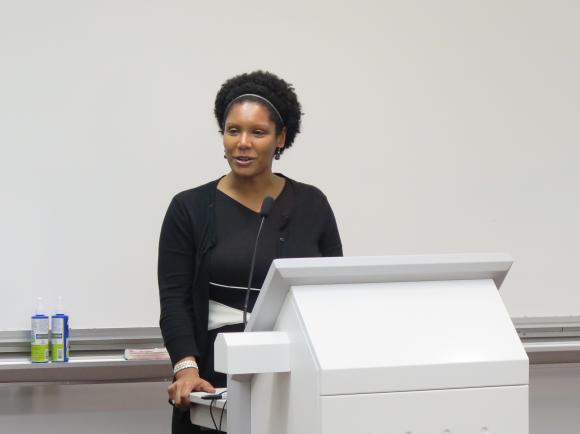
Professor Alexis Karteron and the Constitutional Rights Clinic have worked to restore the right to use the Internet to former offenders.
With the help of Professor Alexis Karteron and the Constitutional Rights Clinic at Rutgers Law School, the Eastern District of New York issued a ruling in favor of the plaintiffs in Jones v. Stanford, blocking New York from enforcing a social media ban, known as e-STOP, against certain categories of individuals on supervised release for sex offenses who did not use the internet as part of their offenses.
The Court held clearly that the state cannot banish people from social media just because of their status as sex offenders, and that any social media or internet restrictions must be tailored individually for those who used the internet to offend.
The Court recognized the importance of social media access, noting “[s]ocial media can provide ‘up-to-the-minute information’ that is not readily available elsewhere, such as local crime alerts, coronavirus updates, details on ongoing demonstrations, and livestreams on Instagram or Facebook.”
“As the COVID-19 pandemic has made clearer than ever, social media access is essential for basic activities like maintaining contact with loved ones and following the news. e-STOP eliminated this access for too many without justification, undermining rehabilitation and reentry into society,” said Karteron. “The district court’s decision affirms that constitutional rights, while not absolute, are not extinguished merely because of involvement in the criminal legal system.”
The clinic, along with the New York Civil Liberties Union and Prisoners’ Legal Services of New York filed Jones v. Stanford in the U.S. District Court for the Eastern District of New York on March 12, 2020.
The case argues that the bans, which are required by a New York law known as “e-STOP” and directives of the NY Department of Corrections & Community Supervision (DOCCS), are grossly overbroad and facially unconstitutional. The bans apply without regard to whether someone poses a risk to reoffend through the internet or social media. Instead, they block access to First Amendment forums to people who have never used the internet or social media to commit an offense. They also block access to websites that offer no possibility of harming minors, including websites used to access news, shopping, and government agencies. In 2017, the Supreme Court struck down a similar law in Packingham v. North Carolina, but New York has continued to impose its unconstitutional policies.
Following the Supreme Court’s decision in Packingham, it concluded that “given e-STOP and Directive 9201’s overbreadth as to both whose speech and how much speech is encumbered, Plaintiffs make a clear and substantial showing that the Ban burdens substantially more speech than necessary and they are likely to succeed on their claims.” It preliminarily enjoined e-STOP and Directive 9201with regard to people required to register as sex offenders who have never used the internet to facilitate commission of a sex offense.
The defendants in the case are Tina Stanford, the chair of the New York Board of Parole, and Anthony Annucci, Acting Commissioner of the New York Department of Corrections and Community Supervision.
Numerous Rutgers Law clinic students contributed to the development of the case, including Julia Burzynski ’21, Rick Wille ’19, Emma Pallarino ’20, Bryan Cheah ’20, Jordan Vincent ’20, Victoria Carvajal ’19, Amanda Williams ’19, Maryanne Abdelmesih ’20, and Emahunn Ali Raheem Campbell ’21.
e-STOP was spearheaded by Governor Andrew Cuomo while he was Attorney General in 2008, targeting social media platforms like MySpace, AIM, and Facebook in its early days. Since its creation, the scale and use of social media has exponentially expanded. e-STOP’s broad definition of social media, which includes many websites that simply allow users to create profiles and comment on products, read the news, or engage with politicians, now covers internet platforms that offer no realistic possibility for sexual offending like Twitter and LinkedIn.